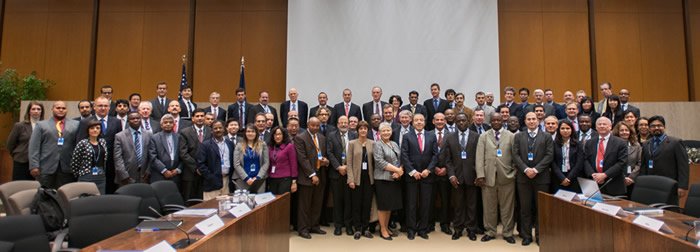2013-2014 Inter-sessional Panel of the UN Commission on Science and Technology for Development (CSTD) took place in Washington DC, from 2 to 4   December 2013.
The meeting was opened by Mr. Andrew Reynolds, Chair of the CSTD and Senior Adviser, Space and Advanced Technologies, U.S. Department of State, who emphasized upon the importance of the two priority themes of the seventeenth session of the CSTD. These were:
- Science, technology and innovation for the post-2015 agenda, and
- ICTs for inclusive social and economic development
The meeting was attended by more than 50 prominent experts from about 40 countries. In the opening session Mr. Alex Dehgan, Chief Scientist and Director, Office of Science and Technology, U.S. Agency for International Development, pointed out key issues on the evolving landscape for science, technology and innovation (STI). H.E. Ambassador Daniel Sepulveda, U.S. Coordinator for International Communications and Information Policy, U.S. Department of State, attested to the essential role of the CSTD in addressing current STI and ICT themes and sharing best practices, and encouraged deliberations on how this role can be fostered.
 CSTD 2013-2014 Inter-sessional Panel |
Following this, Ms. Anne Miroux, Director of UNCTAD's Division on Technology and Logistics, stressed that a "road map" must be set for the CSTD's contributions to development efforts in the years after 2015, when the deadline for the United Nations Millennium Development Goals expires and new goals will be pursued. These goals are widely expected to be centred on the concept of sustainable development. Ms. Miroux told the meeting that science, technology, and innovation should clearly play a crucial role in the development agenda.
Presentations were made on the two substantive themes by Ms. Padmashree Gehl Sampath, Chief, Science and Technology Section, UNCTAD. During the panel discussion, participants stressed that attention should be paid to the possibility of "leapfrogging" by developing countries - that is a sped-up development process in which intermediate stages are skipped, such as has occurred with mobile telephones, which have spared many nations the time and expense of constructing vast landline networks. Panellists also said education to spur advances in science and technology in poor countries should focus on problem solving, particularly for challenges in the spheres of agriculture, energy, water supply, and health. They called for further application of UNCTAD Science, Technology, and Innovation Policy (STIP) Reviews as a way of helping nations to achieve inclusive growth, reduce poverty, and create employment opportunities.
The second day continued with similarly rich discussions of the second priority theme, with a particular focus on how data that has been collected by several multinational companies worldwide can be used to have a better understanding of developmental issues and challenges. An example of this is the potential use of existing data on disease patterns of people to forecast and conduct medical research. ICTs remain key enablers of development, and their absence is a key impediment. Discussions on this theme addressed the very important question of how ICT use and applicability could best be promoted for development, particularly in light of the increasing relevance of new ICT applications.
On the third day, Mr. Hamdi, Head of the CSTD Secretariat, introduced the relevance of the discussions being conducted in the various forums, namely the CSTD, the WSIS Forum, and the IGF for the impending WSIS+10 Review process next April and also for the post-2015 deliberations on the role of ICTs. The meeting considered issues related to the ten-year review of the progress made in the implementation of the outcomes of the World Summit on the Information Society (WSIS) (WSIS+10). The deliberations shed light on how the Commission can better prepare to facilitate discussions on the review of WSIS+10 issues at its seventeenth Session.
Panellists debating the topic stressed the need for post-2015 development strategies to give sufficient emphasis to spurring advances in science and technology that can help less-advanced countries kickstart their economics and raise living standards, with special attention to information and communication technology.


